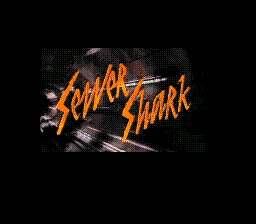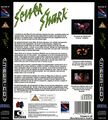Difference between revisions of "Sewer Shark"
From Sega Retro
| Line 18: | Line 18: | ||
| mcd_date_fr=1993-10{{fileref|SelectRound FR 02.pdf|page=2}} | | mcd_date_fr=1993-10{{fileref|SelectRound FR 02.pdf|page=2}} | ||
| mcd_date_br=1993-10<!-- first week -->{{fileref|VideoGame BR 31.pdf|page=6}} | | mcd_date_br=1993-10<!-- first week -->{{fileref|VideoGame BR 31.pdf|page=6}} | ||
| + | | mcd_date_de=1993-09{{fileref|VideoGames DE 1993-09.pdf|page=43}} | ||
| + | | mcd_rrp_de=119,95{{fileref|VideoGames DE 1993-09.pdf|page=43}} | ||
}} | }} | ||
| bbfc=pg | | bbfc=pg | ||
Revision as of 16:33, 14 February 2018
This teeny-tiny article needs some work. You can help us by expanding it.
| Sewer Shark | ||||||||||||||||||||||||||||||
|---|---|---|---|---|---|---|---|---|---|---|---|---|---|---|---|---|---|---|---|---|---|---|---|---|---|---|---|---|---|---|
| System(s): Sega Mega-CD | ||||||||||||||||||||||||||||||
| Publisher: Sony Imagesoft | ||||||||||||||||||||||||||||||
| Developer: Digital Pictures | ||||||||||||||||||||||||||||||
| Genre: Shoot-'em-Up | ||||||||||||||||||||||||||||||
| Number of players: 1 | ||||||||||||||||||||||||||||||
| ||||||||||||||||||||||||||||||
Sewer Shark is a Sega Mega-CD game. It relies heavily on full motion video.
The game was a launch title in North America, and later on in the console's lifespan Sewer Shark was distributed as a pack-in game with the Mega-CD console in certain regions.
Contents
Gameplay
Sewer Shark is a simple on-the-rails shoot-'em-up game where player, piloting a customised "sewer shark" vehicle named "Hole Hawg", is tasked with cleaning up a large sewer network by shooting various creatures. Despite being labeled as the "sewer jockey" (pilot) most of the game involves aiming a target reticule with the D-Pad, and firing a "gattling gun" with ![]() .
.
Only limited control is given to the Hole Hawg's movements - if travelling over an intersection, holding ![]() and using the D-Pad allows the sewer shark to turn 90 degrees in another direction, assuming there is a tunnel to travel down. There is no specific route in Sewer Shark, and the game rarely dictates that you travel in a certain direction, however failing to react to a turn can cause the Hole Hawg to crash and the game end.
and using the D-Pad allows the sewer shark to turn 90 degrees in another direction, assuming there is a tunnel to travel down. There is no specific route in Sewer Shark, and the game rarely dictates that you travel in a certain direction, however failing to react to a turn can cause the Hole Hawg to crash and the game end.
The Hole Hawg cannot be damaged during normal play (save for the "scorpion" enemies which appear in the latter half), however "energy" depletes over time, requiring the player to visit charging stations. Instead, the game is played for points, with navigation robot "Catfish" sometimes recommending directions towards more infested routes (and who has to detonate hydrogen-filled areas). Your co-pilot, "Ghost" also shouts at advice at you, and is also a feature of full motion video cutscenes which break up the action.
A set of full motion clips is used to simulate travelling through the sewers, and remain constant throughout the game, however as time progresses, the player's calling sign is "upgraded" (Dogmeat, Ratbreath, Exterminator, Beachbum) and the music changes. Enemies are a mixture of creatures baked into the full motion video and sprites overlaid on the screen. All in-game music is generated by the Sega Mega Drive's audio chips, as opposed to higher quality audio streamed off the CD-ROM.
The game will finish after roughly 40 minutes of play, with the plot resolving itself regardless of the player's actions.
History
Development
As with Night Trap, Sewer Shark was originally intended for release on Hasbro's cancelled Control-Vision (codenamed NEMO) console - a system that used VHS cassettes as opposed to ROM cartridges. Digital Pictures subsequently picked up the rights to bring the project to the Mega-CD.
On the Control-Vision, Sewer Shark, like Night Trap used four separate video streams which are read simultaneously, allowing for the game to react without the need noticeable loading of data. To achieve this on the Mega-CD, all of the footage was compressed using a bespoke video codec, meaning most of the game is viewed with a border. Night Trap uses similar technology, as does the later produced Prize Fighter.
Release
In North America, 100,000 copies of the Mega-CD game were sold prior to being packed-in with the console[6].
Legacy
Following its Mega-CD launch, Digital Pictures ported the game to the 3DO platform for release in 1994. While gameplay remains largely unchanged, the 3DO version renders at a higher resolution in more colours, bringing the footage closer to the intended VHS quality.
Production credits
- Cast:
- Ghost: David Underwood
- Stenchler: Roberty Costanza
- Falco: Kari G. Payton
- Girl Friday: Stevie Sterling
- Voice of Catfish: Robert Weaver
- Production Coordinator: Craig Boyajian
- Tunnel Music Composed by: Mark Mothersbaugh
- Tunnel Music Orchestrated and Arranged by: Mark Miller
- Incidental Music Composed by: Tom Ferguson, Jay Ferguson
- Sound Effects: Jason Scher, Mark Miller
- Sound: Robert Weaver
- Motion Control Puppets: Chiodo Bros. Productions
- Effects Supervisor: Peter Donen
- Executive Producer: Bob Shepherd
- Producer: Jo Ann Knox
- Production Coordinator: Geri Robert
- Staff Production Coordinator: Michael Yost
- Assistant Director: Harry Wypich
- Director of Photography: Bob Collins
- Assistant Camera: Gary Andertin
- Gaffer: Bob Jason
- Key Grip: Mark Kuramoto
- Script Supervisor: Morgan
- Chief Model Maker: Tom Pahk
- Prototype Engineer: Mike Sorensen
- Sound Mixer: Susan Chong
- Boom Operator: Eric Carr
- Home Economist: Barbara Gray
- Stylist: Debbie Shine
- Production Designer: Jack McAdams
- Casting: Sandra Merrill
- Production Assistants: Jeff Fridlund, Holly Fernandez
- Production Accountant: Debbie Nikkel
- Bookkeeper: Adele Zager
- Production Coordinator: Hunter Johnson
- Production Assistant: Loke Lani Lau
- Electrician: Jim Rosel
- Best Boys: Jim Takahashi, Phil Miller
- Grip: Roger Thompson
- Optical Supervisor: Roger Dorney
- Editorial Supervisor: Dennis Kelly
- Editors: Michael Jackson, Peter Beyt, Tom Sing
- Assistant Editor: Joe Bateman
- Paintbox/Harry Designer: Vikki North
- Film to Tape Colorist: Lyle Hellman
- Assistant Colorist: Earl Williams
- Product Manager: Rich Robinson
- Tester: Nathan Rose
- Chairman of the Board: Martin Erlichman
- Legal Counsel:
- Business Affairs: Barry Tyerman, Armstrong & Hirsch
- Intellectual Property: David Hayes, Fenwick & West
- Additional Programming: Steve DeFrisco, Ken Soohoo
- Testers: David Pier, Matt Kellner
- Production Assistants: Dena Maheras, Malia Lewis
- V.P. Engineering: Mark Klein
- Director, Computer Graphics: Lode Coen
- Computer Graphic Animation: Cuyler Gee
- Interface Design: Joshua Solomon
- Production Accountant: Anne Flautt Read
The events and characters depicted in this photoplay are fictitous. Any similarity to actual persons living or dead is purely coincidental.
Ownership of this interactive U-Direct™ motion picture is protected by copyright, patent, and other applicable laws. Any unauthorized duplication, distribution, or exhibition of this interactive U-Direct motion picture could result in criminal prosecution as well as civil liability.
Filmed in Hollywood, California and on location at Sunset Beach, North Shore, Oahu, Hawaii.
Sewer Shark, Ratigator, Zerk, and Crazy Looking Thing are trademarks of Hasbro, Inc.
U-Direct is a trademark of Digital Pictures, Inc.
Portions © 1992 Sega
© 1992 Digital Pictures, Inc. All Rights Reserved.
Magazine articles
- Main article: Sewer Shark/Magazine articles.
Promotional material
also published in:
- Electronic Gaming Monthly (US) #41: "December 1992" (1992-xx-xx)[7]
- Sega Visions (US) #11: "February/March 1993" (199x-xx-xx)[8]
also published in:
- Electronic Gaming Monthly (US) #43: "February 1993" (199x-xx-xx)[9]
- Sega Visions (US) #11: "February/March 1993" (199x-xx-xx)[10]
Physical scans
| 71 | |
|---|---|
| Based on 34 reviews | |
| Mega-CD, BR (console pack-in) |
|---|
|
References
- ↑ File:GamePro US 038.pdf, page 154
- ↑ 2.0 2.1 2.2 File:CVG UK 140.pdf, page 107 Cite error: Invalid
<ref>tag; name ":File:CVG UK 140.pdf_p107" defined multiple times with different content - ↑ File:SelectRound FR 02.pdf, page 2
- ↑ File:VideoGame BR 31.pdf, page 6
- ↑ 5.0 5.1 File:VideoGames DE 1993-09.pdf, page 43
- ↑ File:GamePlayers US 0611.pdf, page 22
- ↑ Electronic Gaming Monthly, "December 1992" (US; 1992-xx-xx), page 206
- ↑ Sega Visions, "February/March 1993" (US; 199x-xx-xx), page 78
- ↑ Electronic Gaming Monthly, "February 1993" (US; 199x-xx-xx), page 89
- ↑ Sega Visions, "February/March 1993" (US; 199x-xx-xx), page 2
- ↑ 11.0 11.1 File:CVG UK 137.pdf, page 20 Cite error: Invalid
<ref>tag; name ":File:CVG UK 137.pdf_p20" defined multiple times with different content - ↑ 12.0 12.1 File:GamePro US 043.pdf, page 60 Cite error: Invalid
<ref>tag; name ":File:GamePro US 043.pdf_p60" defined multiple times with different content - ↑ 13.0 13.1 File:MeanMachinesSega07UK.pdf, page 78 Cite error: Invalid
<ref>tag; name ":File:MeanMachinesSega07UK.pdf_p78" defined multiple times with different content - ↑ 14.0 14.1 File:SegaForce UK 17.pdf, page 86 Cite error: Invalid
<ref>tag; name ":File:SegaForce UK 17.pdf_p86" defined multiple times with different content - ↑ 1700 igr dlya Sega, "" (RU; 2001-xx-xx), page 201
- ↑ Consoles +, "Décembre 1993" (FR; 1993-1x-xx), page 166
- ↑ Computer + Video Giochi, "Aprile 1993" (IT; 1993-xx-xx), page 96
- ↑ Electronic Games (1992-1995), "January 1993" (US; 1992-12-10), page 94
- ↑ Electronic Gaming Monthly, "December 1992" (US; 1992-xx-xx), page 34
- ↑ Mean Machines: The Essential Sega Guide, "" (UK; 1993-11-18), page 124
- ↑ GameFan, "Volume 1, Issue 3: January 1993" (US; 199x-xx-xx), page 10
- ↑ Game Power, "Maggio 1993" (IT; 1993-0x-xx), page 50
- ↑ GamesMaster, "May 1993" (UK; 1993-04-19), page 26
- ↑ Joypad, "Mars 1993" (FR; 1993-0x-xx), page 62
- ↑ Joypad, "Décembre 1993" (FR; 1993-1x-xx), page 122
- ↑ Sega Mega Drive Advanced Gaming, "April 1993" (UK; 1993-xx-xx), page 48
- ↑ Mega, "April 1993" (UK; 1993-03-18), page 42
- ↑ Mega Action, "July 1993" (UK; 1993-06-17), page 18
- ↑ Mega Action, "Christmas 1993" (UK; 1993-12-02), page 52
- ↑ Mega Force, "Décembre 1993" (FR; 1993-12-10), page 124
- ↑ Mega Fun, "11/92" (DE; 1992-10-xx), page 32
- ↑ Mega Fun, "01/94" (DE; 1993-12-22), page 78
- ↑ MegaTech, "April 1993" (UK; 1993-03-20), page 36
- ↑ Player One, "Décembre 1993" (FR; 1993-1x-xx), page 154
- ↑ Power Up!, "Saturday, December 11, 1993" (UK; 1993-12-11), page 1
- ↑ Power Unlimited, "Nummer 3, Oktober 1993" (NL; 1993-09-29), page 59
- ↑ Score, "Prosinec 1994" (CZ; 1994-12-01), page 44
- ↑ Sega Power, "July 1993" (UK; 1993-06-03), page 44
- ↑ Sega Pro, "June 1993" (UK; 1993-05-13), page 56
- ↑ Sega Zone, "June 1993" (UK; 1993-05-xx), page 50
- ↑ Tricks 16 bit, "Tricks Sega Gold 800 igr" (RU; 1998-03-20), page 226
- ↑ VideoGames Shopper, "January 1994" (UK; 1993-xx-xx), page 44
- ↑ Video Games, "2/94" (DE; 1994-01-26), page 43
- Pages with reference errors
- Sub-stubs
- 1 player games
- US Mega-CD games
- All US games
- EU Mega-CD games
- All EU games
- DE Mega-CD games
- All DE games
- FR Mega-CD games
- All FR games
- BR Mega-CD games
- All BR games
- Mega-CD games
- 1992 Mega-CD games
- All 1992 games
- Mega-CD shoot-'em-up games
- All shoot-'em-up games
- Old content rating field
- All games
- Credits without reference
- GalleryPrintAd file defined
- Old-style rating (cvg)
- Use magref
- Old-style rating (cvgit)
- Rating without source
- Old-style rating (gamepro)
- Old-style rating (gamesmaster)
- Rating without PDF source
- Old-style rating (mdag)
- Old-style rating (mega)
- Old-style rating (megaaction)
- Old-style rating (megatech)
- Old-style rating (mms)
- Old-style rating (playerone)
- Old-style rating (segapower)
- Old-style rating (segapro)
- Old-style rating (segazuk)
- Old-style rating (sfuk)
- Update ratings template
- 15 old ratings








